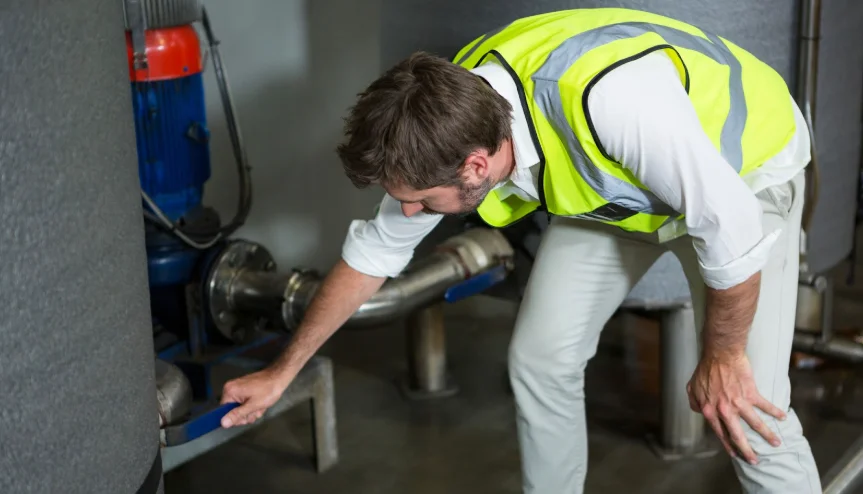Are Gas Companies Responsible for Fixing Leaks or Just Inspecting Them?

Imagine this: you notice a smell of gas in your home, so you immediately contact your gas company. A technician arrives promptly, checks the source of the leak, and assures you that it’s a safety concern. But then, the technician leaves without fixing anything. Instead, you’re told that you need to hire a plumber at your own cost. If you’re left asking, “Isn’t the gas company supposed to fix this?”, you’re not alone.
In this article, we’ll dive into the responsibilities of gas companies when it comes to gas leak inspections and repairs, what you can expect during an inspection, and how to navigate the situation if you end up footing the bill for repairs.
What Gas Companies Are Responsible for: Inspection vs. Repair
Gas companies have strict guidelines when it comes to managing the gas infrastructure they own. Typically, gas companies are responsible for inspecting and maintaining the gas lines that run from their main pipelines to the meter. However, their role often stops there when it comes to any issues inside the property.
- Inspection: Gas companies will inspect the gas meter and external lines to ensure everything is safe and functioning properly.
- Repairs: In most cases, gas companies are not responsible for fixing leaks inside your home. This responsibility generally falls on homeowners, or in some cases, a certified plumber or gas fitter.
This can come as a surprise, especially if you’re used to the idea that the utility company handles all aspects of the service. However, the boundary between the company’s responsibility and the homeowner’s can be murky.
Why Gas Companies Don’t Fix Internal Leaks
Gas companies do not handle internal leaks for a number of reasons:
- Ownership and Liability: Once the gas line passes through the meter and enters your property, it is considered the homeowner’s responsibility. The gas company only maintains their infrastructure up to the meter.
- Safety Regulations: Gas leaks are hazardous, and proper repairs require specialized skills, tools, and certifications. Gas companies often do not employ the right professionals to handle repairs inside homes.
This means that while your gas company can assess the problem, they are generally not authorized to perform repairs within the house. Instead, they are required to ensure that the gas supply is safe up until the point it enters your home.
What You Can Expect During a Gas Leak Inspection
During an inspection, a technician will follow a standard procedure to assess your gas system:
- Detection: The technician will use specialized tools to detect the presence of a gas leak, such as a gas detector or leak detection fluid.
- Assessment: The technician will check external lines for signs of wear, corrosion, or damage.
- Safety Measures: If a leak is found, the technician may shut off the gas supply to prevent accidents.
After the inspection, if the leak is within your property’s lines, the technician will usually inform you of the need for professional repairs by a licensed plumber or gas fitter.
Why You Need to Call a Plumber for Repairs
While your gas company can assess and mark the location of the leak, they are not equipped to fix it. For any repairs beyond the meter, a certified plumber or gas fitter is required. These professionals are trained to safely manage and repair gas lines inside homes, ensuring compliance with safety codes and regulations.
Key reasons to call a plumber include:
- Proper Certification: Licensed plumbers have the certification to handle gas-related repairs.
- Safety: Repairing a gas leak requires specialized knowledge to ensure that the fix is safe and up to code.
- Liability: Ensuring repairs are handled by a licensed professional reduces the risk of future issues or damage.
Cost Considerations: Who Pays for the Repairs?
This is where things can get frustrating. Since the gas company typically does not cover internal repairs, homeowners are left with the cost of hiring a plumber. Depending on the extent of the damage, repair costs can range from $150 to $1,000 or more.
To minimize expenses, consider the following options:
- Contact your insurance: Some homeowner insurance policies may cover the cost of gas leak repairs, though this varies by policy.
- Check with local authorities: In some regions, municipalities offer support or rebates for certain types of gas repairs.
What to Do if You’re Unsatisfied with the Gas Company’s Inspection
If you’re concerned about the gas company’s response or feel like they didn’t properly address the issue, here are some steps you can take:
- File a complaint: Gas companies often have a customer service department where you can escalate your concerns.
- Seek a second opinion: If you’re unsure about the severity of the leak, it may help to get an independent plumber’s assessment.
- Know your rights: Familiarize yourself with your state or country’s regulations surrounding gas leaks, inspections, and repairs to ensure you’re receiving the correct service.
Conclusion: Understanding Gas Company Responsibilities
In conclusion, while gas companies are obligated to inspect the gas lines and ensure they are safe up until the meter, repairing internal leaks is typically outside their scope of responsibility. As a homeowner, you may need to hire a professional plumber or gas fitter for repairs. By understanding the division of responsibility and the steps you can take to manage repairs, you’ll be better prepared if you ever face a gas leak situation in your home.




